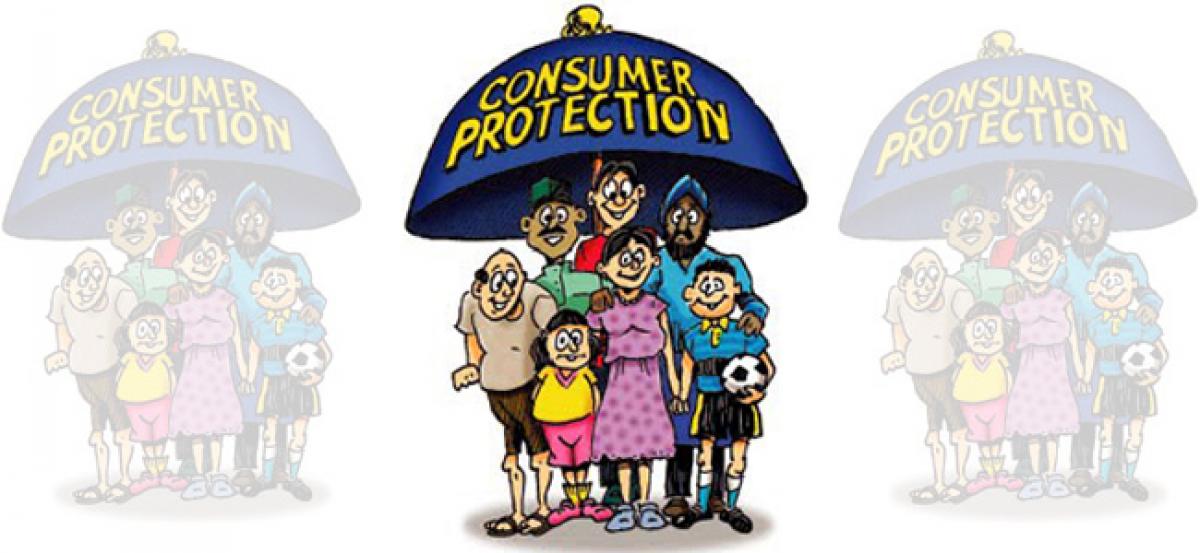Live
- Honda Motorcycle and Scooter India conducts Road Safety Awareness Campaign in Siddipet, Telangana
- Natural Moisturisers You Can Find in Your Kitchen for Dry Skin in Winters
- National Energy Conservation Day 2024: Importance, Date, and Ways to Save Energy
- In 2024, 353 girls enrolled in 33 erstwhile pattern Sainik Schools
- Venkatesh looks as stylish cop in ‘Sankranthiki Vasthunnam’ new song promo
- ‘Drinker Sai’ comes with a catchy song ‘Drinksu Drinksu Drinksu’
- SDT unleashes intensity in ‘Sambarala Yetigattu’ teaser
- Court Adjourns Quash Petition Hearing for Allu Arjun to 21st of December
- Youthful love story ‘Varadhi’ clears censor; set to release soon
- ‘Mardaani 3’ announced with Rani Mukerji’s return as Shivani Shivaji Roy
Just In

A new consumer protection bill that is likely to be tabled during parliament\'s ongoing monsoon session is seen as the next big game-changer for the common man, replacing as it will legislation that has been in force since 1986 when the economic landscape and consumer awareness were in their infancy.
A new consumer protection bill that is likely to be tabled during parliament's ongoing monsoon session is seen as the next big game-changer for the common man, replacing as it will legislation that has been in force since 1986 when the economic landscape and consumer awareness were in their infancy.
Among a slew of measures, the bill proposes to establish an investigating, prosecuting, reviewing and recommending body – the Central Consumer Protection Authority, on the lines of the US Federal Trade Commission (FTC), headed by a Commissioner – to launch inquiries, either suo motu or on a complaint or direction from the government, into violations of consumer rights and to launch prosecution in an appropriate court.
The bill introduces the much-needed concept of affixing liability on a manufacturer or producer and even a product seller in certain specified circumstances for any personal injury, death or property damage caused to a consumer resulting from defects in manufacture, construction, design, formula, preparation, assembly, testing, service, warning, instruction, marketing, packaging, or labelling of any product.
One of the interesting new additions to minimise frivolous litigation is the requirement to deposit 50 per cent of the total amount that the defendant has been asked to pay in terms of the appealable order in case he intends to prefer an appeal to an Appellate Commission.
The penalty for filing a frivolous complaint has also been proposed to be enhanced from Rs 10,000 to Rs 50,000 to minimise baseless and false complaints. In keeping with the changing times, the Bill defines e-commerce while at the same time empowering the Centre to make rules for preventing unfair trade practices in online trade.
Once the new law comes into force, the liability of manufacturers and service providers, online and offline, will not be primarily limited to any consumer who buys goods or avails service but towards all consumers. This paves way for the class action suits introduction in the country in which all affected consumers will derive benefits.
The three-tier structure for adjudicating consumer disputes still remains in the form of district, state and national commissions but with enhanced values at each level looking at the current market realities.
"The consumer protection bill is sought to bring substantial modifications to the Consumer Protection Act, 1986, to address emergence of global supply chains, rapid development of e-commerce and to tackle misleading advertisements, telemarketing, multi-level marketing and direct selling," he added.
The old act is considered to be an inefficient piece of legislation not keeping pace with the new market dynamics, multi-layered delivery chains, innovative and many times misleading advertising and marketing machinery.
“In the changing market place with e-commerce and financial products having made heavy inroads, the outdated Consumer Protection Act of 1988 serves little or no purpose in protecting consumers. Blatant misleading advertisements are selling norms today.
Thus the only way to protect consumers from falling prey is to introduce authoritative powers, strengthening of consumer commissions, class action suits, penalties and host of other measures as exist in the draft amendment bill," Ashim Sanyal, COO of NGO Consumer VOICE, told IANS.
The bill, originally drafted in 2015 and tabled in the Lok Sabha last year, now awaits cabinet approval. Even though it figures in the Lok Sabha's list of business for the monsoon session, this can happen only after the cabinet's nod.
By Vishnu Makhijani

© 2024 Hyderabad Media House Limited/The Hans India. All rights reserved. Powered by hocalwire.com







